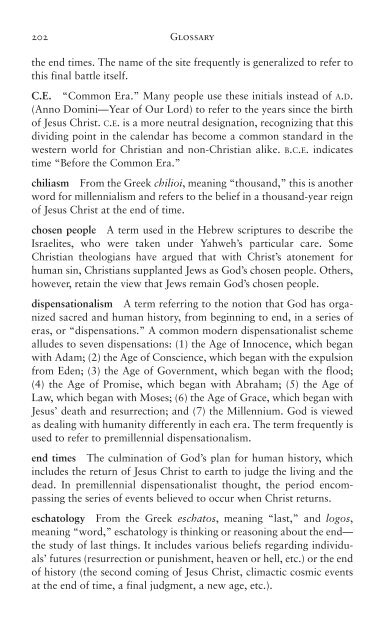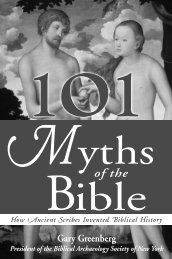Rapture, Revelation, and the End Times - Conscious Evolution TV
Rapture, Revelation, and the End Times - Conscious Evolution TV
Rapture, Revelation, and the End Times - Conscious Evolution TV
You also want an ePaper? Increase the reach of your titles
YUMPU automatically turns print PDFs into web optimized ePapers that Google loves.
202robin-bobinGlossary<strong>the</strong> end times. The name of <strong>the</strong> site frequently is generalized to refer tothis final battle itself.C.E. “Common Era.” Many people use <strong>the</strong>se initials instead of A.D.(Anno Domini—Year of Our Lord) to refer to <strong>the</strong> years since <strong>the</strong> birthof Jesus Christ. C.E. is a more neutral designation, recognizing that thisdividing point in <strong>the</strong> calendar has become a common st<strong>and</strong>ard in <strong>the</strong>western world for Christian <strong>and</strong> non-Christian alike. B.C.E. indicatestime “Before <strong>the</strong> Common Era.”chiliasm From <strong>the</strong> Greek chilioi, meaning “thous<strong>and</strong>,” this is ano<strong>the</strong>rword for millennialism <strong>and</strong> refers to <strong>the</strong> belief in a thous<strong>and</strong>-year reignof Jesus Christ at <strong>the</strong> end of time.chosen people A term used in <strong>the</strong> Hebrew scriptures to describe <strong>the</strong>Israelites, who were taken under Yahweh’s particular care. SomeChristian <strong>the</strong>ologians have argued that with Christ’s atonement forhuman sin, Christians supplanted Jews as God’s chosen people. O<strong>the</strong>rs,however, retain <strong>the</strong> view that Jews remain God’s chosen people.dispensationalism A term referring to <strong>the</strong> notion that God has organizedsacred <strong>and</strong> human history, from beginning to end, in a series oferas, or “dispensations.” A common modern dispensationalist schemealludes to seven dispensations: (1) <strong>the</strong> Age of Innocence, which beganwith Adam; (2) <strong>the</strong> Age of Conscience, which began with <strong>the</strong> expulsionfrom Eden; (3) <strong>the</strong> Age of Government, which began with <strong>the</strong> flood;(4) <strong>the</strong> Age of Promise, which began with Abraham; (5) <strong>the</strong> Age ofLaw, which began with Moses; (6) <strong>the</strong> Age of Grace, which began withJesus’ death <strong>and</strong> resurrection; <strong>and</strong> (7) <strong>the</strong> Millennium. God is viewedas dealing with humanity differently in each era. The term frequently isused to refer to premillennial dispensationalism.end times The culmination of God’s plan for human history, whichincludes <strong>the</strong> return of Jesus Christ to earth to judge <strong>the</strong> living <strong>and</strong> <strong>the</strong>dead. In premillennial dispensationalist thought, <strong>the</strong> period encompassing<strong>the</strong> series of events believed to occur when Christ returns.eschatology From <strong>the</strong> Greek eschatos, meaning “last,” <strong>and</strong> logos,meaning “word,” eschatology is thinking or reasoning about <strong>the</strong> end—<strong>the</strong> study of last things. It includes various beliefs regarding individuals’futures (resurrection or punishment, heaven or hell, etc.) or <strong>the</strong> endof history (<strong>the</strong> second coming of Jesus Christ, climactic cosmic eventsat <strong>the</strong> end of time, a final judgment, a new age, etc.).robin-bobin





